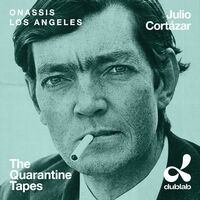The Quarantine Tapes: Quotation Short - Julio Cortázar
Today’s Quotation is care of Julio Cortázar.
Listen in!
Subscribe to the Quarantine Tapes at quarantinetapes.com or search for the Quarantine Tapes on your favorite podcast app!
Julio Cortázar, pseudonym Julio Denis, (born August 26, 1914, Brussels, Belgium—died February 12, 1984, Paris, France), was an Argentine novelist and short-story writer who combined existential questioning with experimental writing techniques in his works.
Cortázar was the son of Argentine parents and was educated in Argentina, where he taught secondary school and worked as a translator. Bestiario (1951; “Bestiary”), his first short-story collection, was published the year he moved to Paris, an act motivated by dissatisfaction with the government of Juan Perón and what he saw as the general stagnation of the Argentine middle class. He remained in Paris, where he received French citizenship in 1981, though he also kept his Argentine citizenship and remained engaged with political causes in Argentina and Nicaragua. He also traveled widely.
Cortázar’s masterpiece, Rayuela (1963; Hopscotch), is an open-ended novel, or antinovel; the reader is invited to rearrange the different parts of the novel according to a plan prescribed by the author. It was the first of the “boom” of Latin American novels of the 1960s to gain international attention. Cortázar’s other novels were Los premios (1960; Eng. trans. The Winners), 62: modelo para armar (1968; 62: A Model Kit), and Libro de Manuel (1973; A Manual for Manuel). A series of playful and humorous stories that Cortázar wrote between 1952 and 1959 were published in Historias de cronopios y de famas (1962; Cronopios and Famas). His later collections of short stories included Todos los fuegos el fuego (1966; All Fires the Fire, and Other Stories), Un tal Lucas(1979; A Certain Lucas), and Queremos tanto a Glenda, y otros relatos (1981; We Love Glenda So Much, and Other Tales). Cortázar also wrote poetry and plays and published numerous volumes of essays.
From https://www.britannica.com/biography/Julio-Cortazar.
For more information about Julio Cortázar:
“Julio Cortázar, The Art of Fiction No. 83”: https://www.theparisreview.org/interviews/2955/the-art-of-fiction-no-83-julio-cortazar
“What Julio Cortázar Might Teach Us About Teaching Writing”: https://www.newyorker.com/books/page-turner/what-julio-cortazar-might-teach-us-about-teaching-writing
“The Subtle Radicalism of Julio Cortázar’s Berkeley Lectures”: https://www.theatlantic.com/entertainment/archive/2017/03/the-subtle-radicalism-of-julio-cortazars-berkeley-lectures/520812/

Πηγή: https://quarantinetapes.com/episodes/the-quarantine-tapes-quotation-short-julio-cortazar-ad_WaecF
